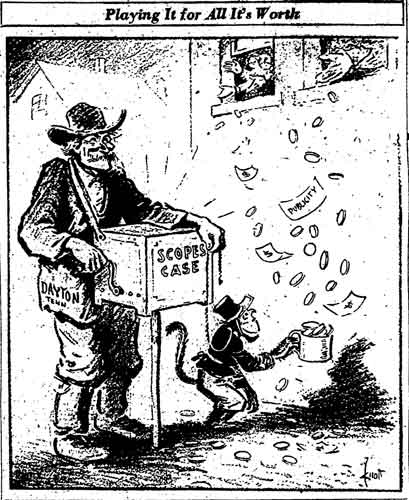History teaches us not to repeat our mistakes. I guess Texas BOE failed history class.
http://www.youtube.com/watch?v=ubWcr4bxWtM&feature=player_detailpage
In 1925, there was a trial of a Tennessee public school teacher, John Scopes. Scopes was said to have violated the state’s Butler Act which forbade teaching evolution. Scopes was convicted but later appealed and the judgment was overturned due to a technicality. The trial (also known as the Monkey Trial) was actually a publicity stunt in order to gain Dayton, Tennessee some attention. Scopes even convinced students to testify that he taught evolution in class. Regardless of this back story (which was unknown to me) this trial is a very important part in scientific history as well as that of the United States. It indirectly contributed to the National Defense Education Act as well as struck a blow to fundamental theologians. The video posted above is a collection of pictures and recordings from the actual trial as well as scenes from the 1960s movie, Inherit the Wind. Within the video you see and hear every major player in the trial including, William Jennings Bryan and Clarence Bryan.



 In 1859, Charles Darwin published a book titled On the Origin of Species. Darwin’s work was one of the most influential books in history, and we still use many terms coined by him today. The main idea of the book is that plants and animals that are more suited to survive in their environments will survive, and that they will replace those that cannot adapt. This view was very similar to the pre-Civil War view, which justified slavery. During the Gilded Age many people were fighting for social equality, and Darwin’s book posed a serious threat to their efforts.
In 1859, Charles Darwin published a book titled On the Origin of Species. Darwin’s work was one of the most influential books in history, and we still use many terms coined by him today. The main idea of the book is that plants and animals that are more suited to survive in their environments will survive, and that they will replace those that cannot adapt. This view was very similar to the pre-Civil War view, which justified slavery. During the Gilded Age many people were fighting for social equality, and Darwin’s book posed a serious threat to their efforts.